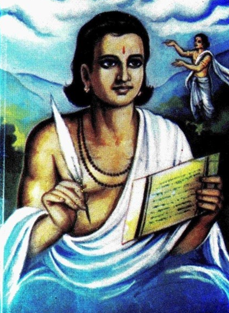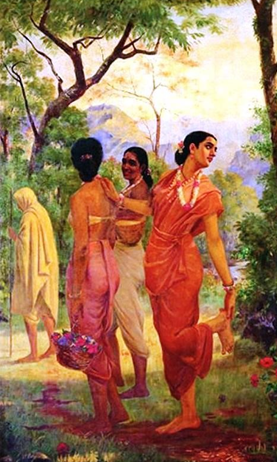Talk:Scholars of Hindu Languages, Arts & Law:Kālidāsa
By Vishal Agarwal
Kālidāsa is celebrated as the greatest poet and dramatist of the Saṃskṛta (Sanskrit) language and one of the finest literary figures of ancient India. He is believed to have lived around the 5th century CE. Tradition describes him as a man of great physical beauty but lacking in education and wisdom in his early years.
At that time, a learned princess from central India, known for her intelligence, had grown proud of her knowledge. She had declared that she would marry only a man who could defeat her in a philosophical debate. To humble her arrogance, a group of scholars devised a clever plan. They found Kālidāsa, who was simple-minded, and decided to make him appear as a learned man. Dressing him in scholarly robes, they instructed him to respond to the princess only with gestures and remain silent during the debate.
When the princess posed questions, Kālidāsa responded with random hand signs. The scholars accompanying him cleverly interpreted these gestures as profound philosophical answers, which greatly impressed the princess. Convinced of his wisdom, she accepted defeat and married him.
However, after marriage, the princess soon discovered the truth and, angered by the deception, insulted her husband’s ignorance. Deeply hurt, Kālidāsa left his home, vowing to return only after attaining true scholarship.
He undertook intense study and worshipped Devī Kālī with great devotion. Blessed by her grace and strengthened by his perseverance, he mastered Saṃskṛta grammar, poetry, and philosophy. When he returned after several years, his wife greeted him with a question in Saṃskṛta asking whether he had become a scholar. To her astonishment, Kālidāsa instantly composed a series of verses, each beginning with one word from her sentence. Realizing his transformation, she joyfully welcomed him back.
In the following years, Kālidāsa composed several masterpieces of poetry and drama. His works, including Abhijñāna Śākuntalam (The Recognition of Śakuntalā), Meghadūta (The Cloud Messenger), and Raghuvaṃśa (The Lineage of Raghu), became renowned during his lifetime and continue to be celebrated today.
Kālidāsa is said to have been one of the Navaratna-s (Nine Gems) at the court of King Vikramāditya. Centuries later, beginning in the 18th century, his plays and poems were translated into many European languages, such as German and English, bringing him global recognition.
The life of Kālidāsa illustrates the transformative power of determination and divine grace. It teaches that even one who begins in ignorance can, through effort, devotion, and the blessings of Bhagavān, rise to the heights of wisdom and creativity.


